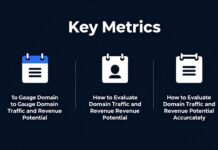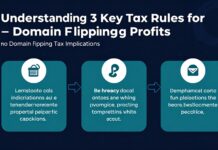In the ever-evolving world of online entrepreneurship, domain auctions have emerged as a powerful tool for savvy investors looking to grow their domain portfolio. But how do you navigate this competitive landscape effectively? This article will delve into the exciting realm of domain auctions, offering insider tips and strategies that can transform your approach to acquiring valuable internet real estate. Whether you’re a seasoned investor or just starting out, understanding the nuances of domain auctions can unlock incredible opportunities for profit.
Imagine walking away from an auction with a domain name that not only enhances your brand’s visibility but also positions you ahead of your competitors. Domain auctions provide a unique opportunity to acquire premium domain names that are otherwise unavailable on the open market. But, how can you spot the hidden gems amidst the noise? In the following sections, we’ll explore effective techniques for researching and bidding on domains that align with your business goals. From identifying trending keywords to understanding market demand, you’ll learn how to make informed decisions that can amplify your portfolio’s value.
Moreover, leveraging domain auctions isn’t just about acquiring names; it’s also about being strategic. Have you ever wondered how some investors seem to always land the best domains? We’ll uncover their secrets and provide actionable insights into setting a budget, timing your bids, and utilizing auction platforms effectively. Get ready to dive into the world of domain auctions and discover how you can grow your portfolio with confidence and ease!
Unlocking Hidden Gems: The Ultimate Guide to Finding Profitable Domains at Auctions
In the fast-paced world of online business, domain names are like real estate in the digital landscape. They can make or break your brand’s identity, and finding the right one can be a challenge. One of the best ways to discover profitable domains is through auctions. In this guide, we’ll explore how to unlock hidden gems at domain auctions and how they can help you grow your portfolio effectively.
Understanding Domain Auctions
Domain auctions are platforms where domain names are sold to the highest bidder. These auctions can feature expired domains, premium domains, or simply domains that owners no longer want. The beauty of these auctions is that they often provide opportunities to acquire domains at a fraction of their market value.
Types of Domain Auctions:
- Expired Auctions: Domains that have not been renewed by their previous owners.
- Premium Auctions: High-value domains that are put up for auction by their owners.
- Private Auctions: Domains sold through invitation-only events, often featuring exclusive names.
Why Participate in Domain Auctions?
Engaging in domain auctions can significantly enhance your portfolio. The reasons to participate are many, including:
- Cost-Effective Opportunities: Many domains can be purchased for less than their perceived value.
- Diverse Selection: Auctions often have a wide range of domains in various niches.
- Potential for Resale: Buying domains at auction can lead to profitable resale opportunities.
Tips for Finding Profitable Domains
When it comes to finding profitable domains, you should focus on doing your research and understanding market trends. Here are some practical tips that could help:
- Look for Keywords: Domains with popular search terms often fetch a higher price.
- Check Domain Age: Older domains can have better SEO value.
- Evaluate Brandability: The more memorable and catchy the domain, the more potential it has for resale.
- Use Analytics Tools: Tools like SEMrush or Ahrefs can help you analyze domain performance.
How to Bid Successfully
Bidding at domain auctions requires strategy. Here’s how to improve your chances of winning desirable domains:
- Set a Budget: Know how much you’re willing to spend before entering the auction.
- Research Bidding Patterns: Observe how other bidders behave, this can give you insights into optimal bidding strategies.
- Use Proxy Bidding: Some auctions allow proxy bidding, where you set a maximum bid and the system automatically bids for you up to that limit.
Common Mistakes to Avoid
While domain auctions can be lucrative, they also come with pitfalls. Here are some common mistakes to avoid:
- Overspending on Flimsy Domains: Just because a domain is popular doesn’t mean it’s worth a high price.
- Ignoring Renewal Fees: Remember to factor in the cost of renewing the domain each year, as some premiums can get expensive.
- Skipping Due Diligence: Always check the history of a domain to ensure it doesn’t have a bad reputation or spammy past.
Resources for Domain Auction Enthusiasts
If you are serious about diving into the world of domain auctions, here are some platforms you might consider:
- GoDaddy Auctions: One of the largest platforms with a vast selection.
- NameJet: Focuses on premium domains and has a good reputation.
- Sedo: Offers a marketplace for buying and selling domains.
The Future of Domain Auctions
As the digital space continues to grow, the demand for unique domain names will likely increase. This means that participating in domain auctions could become an even more important strategy for those looking to expand their online presence.
Final Thoughts
Finding profitable domains at auctions can be both exciting and rewarding. With the right approach, you can unlock hidden gems that can bolster your online business. Remember to do your research, set a budget, and avoid common pitfalls. Domain auctions are not just a gamble; they can be a strategic move to enhance your portfolio. Dive in and start exploring; you never know what treasures you might find!
5 Proven Strategies to Outbid Competitors and Secure High-Value Domain Names
In the fast-evolving world of domain names, being able to outbid your competitors for high-value domains can be a game changer. Domain auctions not just offer a platform for buying and selling, but they also provide unique opportunities for investors to grow their portfolios effectively. If you’re looking to navigate this competitive landscape, here are 5 proven strategies to outbid your competitors and secure those coveted domain names while leveraging domain auctions to your advantage.
Understand The Market Dynamics
Before you even think about placing a bid, it’s essential to have a solid grasp of the market. Domain names, like real estate, have their own set of trends and dynamics. Research is crucial.
- Identify Popular Keywords: High-value domains often contain popular keywords. Use tools like Google Trends to find out what’s currently trending.
- Analyze Past Auctions: Check past auction results to understand what similar domains sold for. Websites like NameBio can provide historical data.
- Know Your Competitors: Keep an eye on who else is bidding. If you know their bidding habits, you can strategize better.
Set A Budget And Stick To It
When it comes to domain auctions, it can be easy to get carried away in the heat of the moment. Setting a clear budget helps in keeping your finances in check.
- Determine Maximum Bid: Decide the maximum amount your willing to spend on a domain. This will help avoid impulse bidding.
- Account for Additional Costs: Don’t forget to factor in auction fees, transfer costs, and renewal fees into your budget.
- Stay Disciplined: Once you set your budget, stick to it. It’s better to miss out on a domain than to overspend and regret it later.
Leverage Bidding Strategies
Employing smart bidding strategies can make a significant difference in winning high-value domains. Here are some effective tactics:
- Early Bids: Placing an early bid can establish your intent and potentially scare off less serious bidders.
- Sniping: Some bidders prefer to wait until the last few moments of the auction to place their bid. This can be a risky move but can pay off if timed correctly.
- Incremental Bidding: Instead of jumping to your maximum bid right away, consider placing smaller incremental bids to gauge the interest of competitors.
Use Auction Platforms Wisely
Choosing the right auction platform is just as important as the bidding strategies you employ. Different platforms offer unique advantages.
- Sedo: Known for its vast inventory and user-friendly interface, Sedo is popular among domain investors.
- GoDaddy Auctions: One of the largest domain auction platforms, it provides access to a wide range of domains and a robust community of bidders.
- Flippa: While primarily known for websites, Flippa also has a strong domain auction section, attracting buyers looking for quality domains.
Build Relationships With Other Bidders
Believe it or not, building relationships with other bidders can help you in the long run. Networking is often overlooked but can be a key to success.
- Join Online Forums: Engage in communities like DNForum or NamePros where you can connect with other domain investors.
- Attend Conferences: Events such as NamesCon provide a platform to meet potential partners or competitors face to face.
- Collaborate on Investments: Sometimes, teaming up with another bidder can lead to mutually beneficial outcomes, especially for high-value domains.
How to Use Domain Auctions to Grow Your Portfolio
Utilizing domain auctions effectively can lead to substantial growth in your domain portfolio. Here’s how to maximize your investments:
- Diversify Your Portfolio: Don’t just focus on one type of domain. Invest in a mix of short domains, brandable domains, and keyword-rich domains.
- Monitor Trends: Stay updated with industry news. Understanding what types of domains are gaining interest can help you buy low and sell high.
- Evaluate Potential Resale Value: Before purchasing, consider how much you could potentially sell the domain for in the future. Tools like Estibot can help assess value.
- Regularly Review Your Portfolio: Periodically assess your holdings. If certain domains aren’t performing, consider selling them to reinvest in more promising ones.
By employing these strategies, you can position yourself not only to outbid competitors but also to effectively grow your domain portfolio through auctions. The world of domain investing is filled with opportunities—if you know how to navigate it wisely. The key is to remain informed, strategic, and, above all, patient. Just remember, every bid counts, and sometimes the best victory is simply knowing when to walk away.
The Top 10 Mistakes to Avoid When Bidding on Domain Auctions for Portfolio Growth
Bidding on domain auctions can be a thrilling but also a daunting task, especially if you’re looking to grow your portfolio. Many new and even seasoned investors make mistakes that can cost them dearly. Understanding these pitfalls is crucial for successful bidding. Here’s a look at the top 10 mistakes to avoid when participating in domain auctions, and how to effectively use these platforms to expand your collection.
1. Not Researching Domain Value
Many bidders jump into auctions without doing their research on the domain’s actual value. It’s essential for know what makes a domain valuable. Factors like keyword relevance, length, and extension (.com, .net, etc.) play a big role. Use tools like Estibot or GoDaddy’s valuation tool to get an idea of worth.
2. Ignoring the Auction Format
Different auctions have different formats. Some are live, others are silent, and some are reserve-based. Not understanding these formats can lead to confusion and missed opportunities. For example, in live auctions, the excitement can cause bidders to overspend, while in silent auctions, a more strategic approach is needed.
3. Failing to Set a Budget
A budget is important, but many bidders don’t set one. It’s easy to get carried away in the heat of the moment. Set a clear budget before entering the auction and stick to it, no matter how tempting it might be to go over. This prevents overspending and keeps your portfolio healthy.
4. Overlooking Domain Age
Age can be a significant factor in a domain’s value. Older domains tend to have established authority and potentially better SEO rankings. When bidding, consider how long the domain has been registered and how this might impact its future performance.
5. Not Paying Attention to Renewal Costs
Some domains may seem like a great deal at auction, but they could have high renewal costs. Always check what the renewal fees might be before placing a bid. It’s not just the initial purchase price that matters, but also the long-term investment.
6. Getting Emotional
Bidding can be an emotional roller coaster. Many bidders end up making irrational decisions based on emotion rather than logic. Always keep your head cool and make decisions based on research and strategy, not feelings. This can save you from buyer’s remorse later.
7. Failing to Monitor Competitors
Not keeping an eye on your competitors can be a critical mistake. Watch who else is bidding on the same domains and try to gauge their strategy. This can help you decide whether to increase your bid or back off.
8. Underestimating the Importance of Timing
Timing is everything in domain auctions. Some domains may get more bids at certain times of the day or week. Research the auction’s history to find out when the best times are to bid. If you know when to jump in, you may find better deals.
9. Not Using Proxy Bidding
Many auction platforms offer proxy bidding, where you can set your maximum bid and let the system bid for you. Not using this feature can lead to missed opportunities. It allows you to stay in the game without constantly monitoring the auction.
10. Overbidding Due to Competition
Seeing others bidding can lead you to overbid. It’s important to remember that not every domain is worth its auction price. Stick to your research and budget, and don’t let competition cloud your judgment.
Utilizing Domain Auctions for Portfolio Growth
Domain auctions can be a powerful tool for growing your portfolio, if used correctly. Here’s how:
Identify Your Niche: Focus on a specific market or industry. This helps in finding valuable domains that align with your interests.
Build Relationships: Networking with other domain investors can lead to valuable insights and potential partnerships.
Diversify Your Portfolio: Don’t just focus on one type of domain. Look for a mix of premium domains, brandable names, and keyword-rich domains to spread your risk.
Leverage Analytics Tools: Use tools like Google Analytics to track traffic and performance of your purchased domains. This data can inform future buying decisions.
Participate in Multiple Auctions: Don’t limit yourself to just one auction platform. Different sites have different offerings and prices. Explore multiple avenues for the best results.
Stay Informed: The domain market is always changing. Follow industry news, trends, and updates to stay ahead of the curve.
With these insights, you can make the most of domain auctions and avoid common pitfalls that can hinder your portfolio growth. Remember, success in domain investing comes from careful planning, continuous learning, and a strategic approach. Happy bidding!
How to Evaluate Domain Worth: Expert Tips for Smart Auction Investments
Evaluating domain worth can be a tricky process, especially when you’re looking to make smart investments in the ever-changing world of domain auctions. Knowing how to navigate these auctions can really help you grow your portfolio effectively. Here’s some expert tips that will guide you through evaluating domain worth and making the most of auctions.
Understanding Domain Valuation
When it comes to domain names, their worth is determined by several factors, and it’s not just about the price tag. The valuation of a domain can depend on:
- Length of the domain: Shorter domains often have a higher value.
- Keyword relevance: Domains that are rich in keywords related to popular industries tend to be more valuable.
- Brandability: A name that’s easy to remember and pronounce can fetch a higher price.
- TLD (Top-Level Domain): Different domain endings like .com, .net, or .org can greatly impact value. Generally, .com domains are the most sought after.
- Historical sales data: Looking at what similar domains have sold for can give you a good reference point.
There are tools available, like Estibot or GoDaddy Appraisal, that can help evaluate a domain’s worth but remember, no automated tool is perfect.
How to Evaluate Domain Worth
To properly assess a domain’s value, consider these steps:
- Research Similar Sales: Websites like NameBio provide data on past sales of similar domains. This can help you gauge what you might expect to pay.
- Use Valuation Tools: Although not always accurate, tools can provide a quick estimate.
- Consider the Domain’s Age: Older domains often carry more weight and trust, potentially increasing their value.
- Check SEO Potential: Look at the domain’s backlink profile and SEO history. A domain with established traffic and backlinks can be worth more.
- Assess the Market Demand: Does the domain fit into a niche with high demand? If so, it could be worth more.
Using Domain Auctions to Your Advantage
Domain auctions can be a goldmine if you know how to use them effectively. Here’s how you can grow your portfolio through smart auction strategies:
- Set a Budget: Before you dive into an auction, decide how much you’re willing to spend. Stick to it!
- Monitor Auctions Regularly: Sites like Sedo, Flippa, and GoDaddy Auctions have numerous listings. Regularly checking can help you find hidden gems.
- Bid Strategically: Bidding early can sometimes drive prices up. Consider waiting until the last moment to place your bid for a better shot at winning at a lower price.
- Understand Auction Types: Different auction types — like reserve price auctions or no-reserve auctions — can offer different opportunities. Know what you’re getting into.
- Network with Other Investors: Building relationships in the domain community can lead to better opportunities and insights.
Key Factors to Watch for in Auctions
Here’s a quick list of factors to keep in mind while participating in domain auctions:
- Traffic Data: Domains with existing traffic can be more valuable.
- Renewal Costs: Some domain extensions have higher renewal fees; factor this into your budget.
- Potential for Development: Consider if the domain can be developed into a profitable website.
- Legal Issues: Always check for any trademarks or legal disputes associated with the domain.
Practical Examples of Domain Investments
Let’s say you find a domain like “BestCoffee.com”. It’s short, memorable, and has strong keyword potential. You check out past sales and see that similar domains have sold for $10,000. You might want to bid up to that amount if it fits your budget.
Another example could be “2023TravelDeals.net”. It has a decent length but not as strong a TLD. After researching, you see that similar domains in the travel industry have sold for around $1,500. You may decide to bid more conservatively, perhaps aiming to keep your max bid at $800.
Final Thoughts
Knowing how to evaluate domain worth and using domain auctions strategically can significantly enhance your investment journey. Remember, patience and research are key; don’t rush into purchases without doing your homework. As the domain market continues to evolve, those who stay informed and flexible will likely reap the most rewards.
Maximize Your Returns: Case Studies of Successful Domain Auction Investments
Maximizing returns from domain auction investments is a hot topic among investors today. Many people often wonder how they can leverage these auctions to not only grow their portfolio, but also secure high-value domains that could appreciate over time. In this article, we’ll explore various case studies of successful domain auction investments, practical strategies for using domain auctions effectively, and what you need to keep in mind to maximize your returns.
The Rise of Domain Auctions
Domain auctions has become an essential part of the domain investment landscape. Since the early 2000s, the market has seen a significant increase in interest, fueled by the growth of online businesses. In 2021 alone, the domain market was estimated to be worth over $4 billion. This growth is driven by the increasing value of online presence for businesses and individuals, making valuable domain names a sought-after asset.
Successful Case Studies of Domain Auction Investments
Let’s look at a few case studies which demonstrate how investors successfully flipped domains purchased from auctions:
Voice.com: This domain was sold for a whopping $30 million in a private sale after being purchased for a fraction of that price in an auction. The buyer recognized the potential of the domain name and capitalized on the rising trend of voice technology.
360.com: Acquired for $17 million, this domain was bought at an auction by a Chinese company. They understood the brand value and the growing tech market in China, which led to a significant return on their investment.
Insurance.com: This domain fetched $35.6 million in 2010. Originally bought for $1.5 million in an auction, it highlights how premium domains can appreciate tremendously if held long enough.
These examples shows how smart investments in domain auctions can lead to substantial returns, but it requires some strategic planning and insight into market trends.
Strategies for Growing Your Portfolio Through Domain Auctions
To effectively grow your portfolio via domain auctions, consider the following strategies:
Research Market Trends: Understanding what industries are thriving can help you identify valuable domain names. For instance, domains related to technology, health, and finance often fetch higher prices.
Set a Budget: It’s important to set a budget before you start bidding. Auctions can get competitive, and it’s easy to overspend if you’re not careful.
Focus on Keywords: Domains that contain popular keywords are usually more valuable. Use keyword research tools to find trending terms in your target market.
Participate Regularly: Consistency is key. Regular participation in auctions builds your reputation and helps you get familiar with the bidding process.
Evaluate Domain History: Use tools to check the history of the domain. If it has been associated with spammy content or has a bad reputation, it may not be worth investing in.
How to Leverage Auctions for Maximum Returns
Here are some additional steps to take to maximize your investment returns through domain auctions:
Diversify Your Investments: Don’t put all your eggs in one basket. Invest in a variety of domains across different niches to mitigate risk.
Sell at the Right Time: Timing can be everything in domain investing. Keep an eye on market trends and be ready to sell when demand is high.
Build a Brand: If you acquire a domain that has potential, consider developing a website around it. This can significantly increase its value.
Network with Other Investors: Engaging with the domain investing community can provide insights and potential partnership opportunities.
Potential Risks Associated with Domain Auctions
While the rewards can be significant, it’s also crucial to be aware of the risks involved in domain auction investments:
Market Volatility: The domain market can be unpredictable. Just because a domain is popular today doesn’t mean it will be tomorrow.
High Competition: Many investors are competing for the same prime domains, which can drive up prices.
Legal Issues: Ensure that the domain doesn’t infringe on trademarks or copyrights, as this can lead to legal complications down the line.
Psychological Factors: Emotional bidding can lead to poor decisions. Stay rational and avoid getting attached to a certain domain.
Investing in domain auctions can be a rewarding venture if approached with strategy and care. By analyzing successful case studies, employing effective strategies, and understanding potential risks, you can maximize your returns while building a diverse and profitable domain portfolio. As the digital landscape continues to evolve, the right domain could be your ticket to significant financial success.
Conclusion
In conclusion, leveraging domain auctions can be a powerful strategy for expanding your portfolio and increasing your investment potential. By understanding the auction process, researching market trends, and identifying valuable domain names, you can make informed bids that align with your goals. Remember to set a budget to avoid overspending, and consider the long-term value of each domain, including its potential for future resale or development. Engaging with the domain auction community can also provide insights and opportunities that enhance your purchasing decisions. As you embark on this journey, stay patient and persistent—success in domain investing often comes with time and experience. Now is the perfect moment to explore upcoming domain auctions and start building a diverse portfolio that could yield significant returns. Don’t hesitate; take action today and watch your investments flourish!













